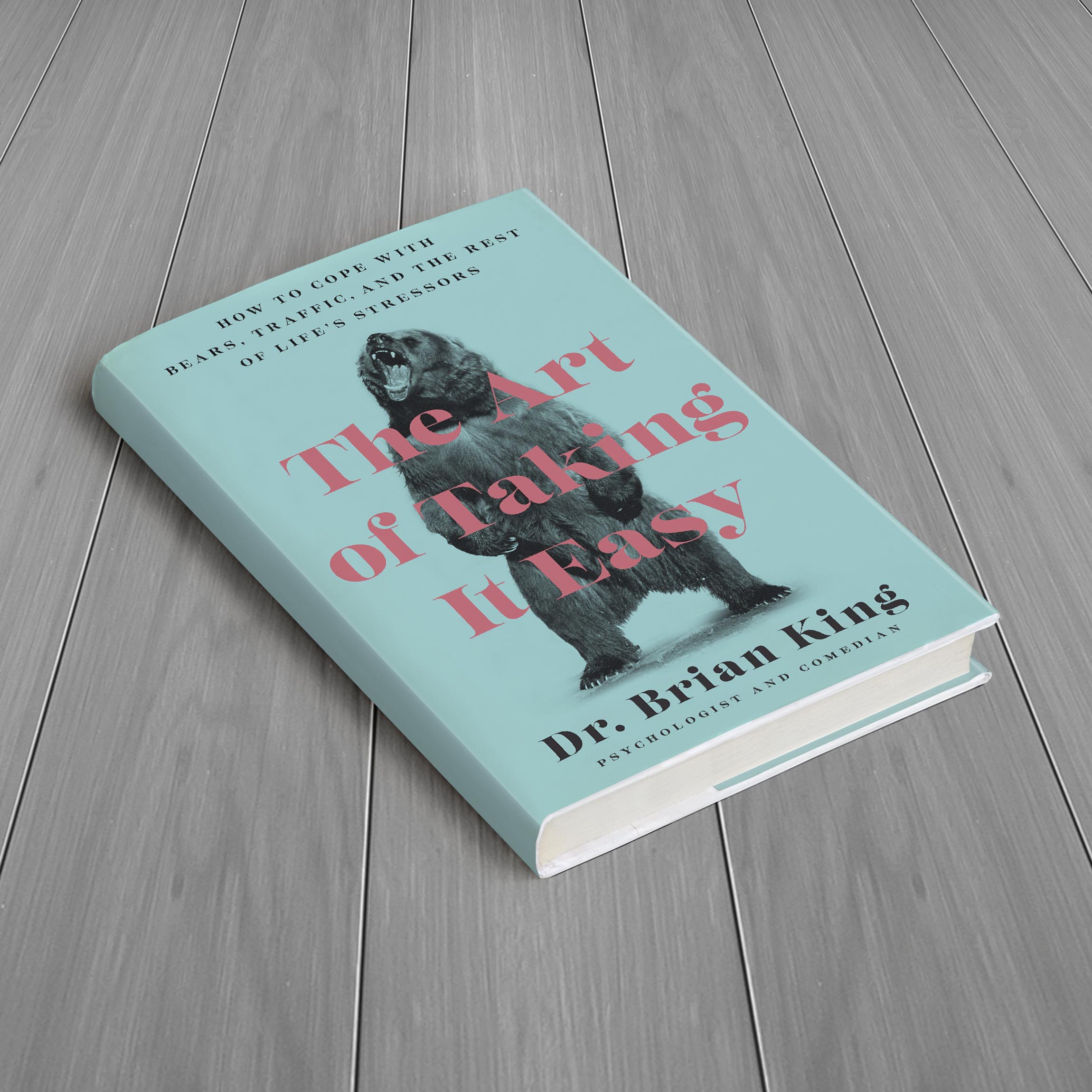BOOK NOTES
“The Art of Taking it Easy”
How to Cope with Bears, Traffic, and the Rest of Life’s Stressors
Book Written by Dr. Brian King

Notes by Sarah Verno
10 FEBRUARY 2021
The market for stress management books is undeniably over-saturated, but a Colorado author with a comedy background and a psychology degree… I had to check it out.
While the insights on stress and its impacts to our bodies were not new, the way in which the author framed the topic was extremely well done.
Market saturated or not, when I came across this part of his story I realized I could probably learn a lot from this guy:
Waking up and finding a stranger sleeping in your car seems like one of those events that only happens to somebody once. Yeah, not this guy. About a month or so later, it happened again.
Once again, I came out of my apartment all ready and eager to go to stressful graduate school and train some rats or something. Once again, I saw the familiar image of a lone dude using my car to catch some Zs. This time he was up front, sleeping in the passenger seat. I knocked on the window. He didn’t answer. I knocked a little louder. He didn’t answer. Great, the last thing I need is to start my day dealing with a dead guy in my car. I opened the door, checked his breathing. He was alive, just passed out cold. So cold that he wouldn’t respond to anything, not even being nudged or tapped on the cheek.
I couldn’t just leave him on the sidewalk, so that was the morning that I drove to school with a passed-out stranger riding shotgun. He slept the entire drive. I arrived at campus, found a parking spot, and left him there while I went to class.
Damn.
Pervasive negative thinking. Assuming the worst. Defaulting to worry. Toxic behaviors like these substantially impact our health and happiness. If we want to make significant changes to our lives, we must change the way we think. The smaIl steps we can take each day to improve our ability to handle stress make a difference for our ability to break the behaviorial cycles that keep us a prisoner to it.

“In the simplest terms, changing a behavior usually involves understanding why you do it and finding a suitable alternative. Because worrying relieves inactivity by giving the brain something to do, if you want to worry less you should find something else for your brain to do. But then what could possibly be a suitable alternative to worrying? How about literally anything else!”
Dr. Brian King, author of “The Art of Taking it Easy”

Learn to tell the difference between bears and traffic.
Learn to assess your stress. When we start to recognized perceived threats versus actual threats, healthy stress management becomes a lot more realistic. It’s easy to find ourselves getting worked up (subconsciously or consciously) and making choices based on what could happen rather than what is actually happening. As soon as we encounter a “bear” (i.e. a potential stress-inducing problem) we need to stop and ask ourselves 2 important questions:
- Is this an actual threat?
- If it is an actual threat, then can I do anything about it?
If your answers are “Yes,” then make a plan and do it.

“We begin responding to stress before we have a chance to think about it. However, we have the ability to overcome our initial response.”
Dr. Brian King, author of “The Art of Taking it Easy”
Worrying does nothing to prevent bad things from happening, so stop that shit.

Worrying is counterproductive. The best thing you can do if you are inclined to worrying is to understand why you worry – what leads you to repeatedly engage in this behavior – so you can do something to overcome it. The next best thing you can do is get your mind busy. Worry is the brain’s way of relieving uncomfortable “inactivity” – it gives the brain something to do.
So, before you lose yourself to worry, remember you have options. “…it probably doesn’t matter why you react that way, only that you start actively choosing another reaction.” (Dr. Brian King)
“Worrying does not affect the outcome of a situation, it doesn’t make adverse events less likely to occur, it just makes our life less great…”
Dr. Brian King, author of “The Art of Taking it Easy”

Adversity is good for you.
Studies continue to show that happiness is strongly associated witihpsychological resilience. I.e. If you are happy, you are typically managing your stress well, and if you are stressed, you are probably not happy.
If you start treating stressful events like problems that need to be solved, your brain will get better at problem solving. In turn, the next time a similar probelm arises, your brain is more likely to respond as if it is has a solution (and the less your reactions will be influenced by feeling stressed).
Resilience is our ability to recover from adversity, to bounce back or return to equilibrium after experiencing an adverse event. It is a major component in coping with and recovering from stressful events… Put simply, our thoughts make us resilient. How we process information and what we think following an adverse event has a great deal of influence over how quickly we will recover.”
Dr. Brian King, author of “The Art of Taking it Easy”
Grow your appreciation for humor
Humor helps us keep our brains from becoming unnecessarily stressed.
“Humor is our brain’s ability to recognize a potentially threatening stimulus as amusing or nonthreatening. It involves initially perceiving the stimulus one way, and then immediately reinterpreting it as something else. The brain recognizes this process as humorous.”

“Having a sense of humor means being able to understand things in multiple ways, and this is incredibly helpful in overcoming stress.“
Dr. Brian King, author of “The Art of Taking it Easy”
Even the physical act of laughing helps relieve tension and increase feelings of happiness (check out the James-Lange Theory of Emotion for more info on this correlation)..
“From the electrical activity in the brain as you process the humor, to the facial muscles that make you smile and laugh, to the diaphragm that forces the lungs to inhale and exhale, to the arm and leg muscles that are engaged when you clap and stomp your feet, laughter inspires a tremendous chain of bodily activity. Laughter is a profound release of stress, which reduces cortisol and has the added bonus of making us feel good.”
A few more quick takeaways for better stress management:
